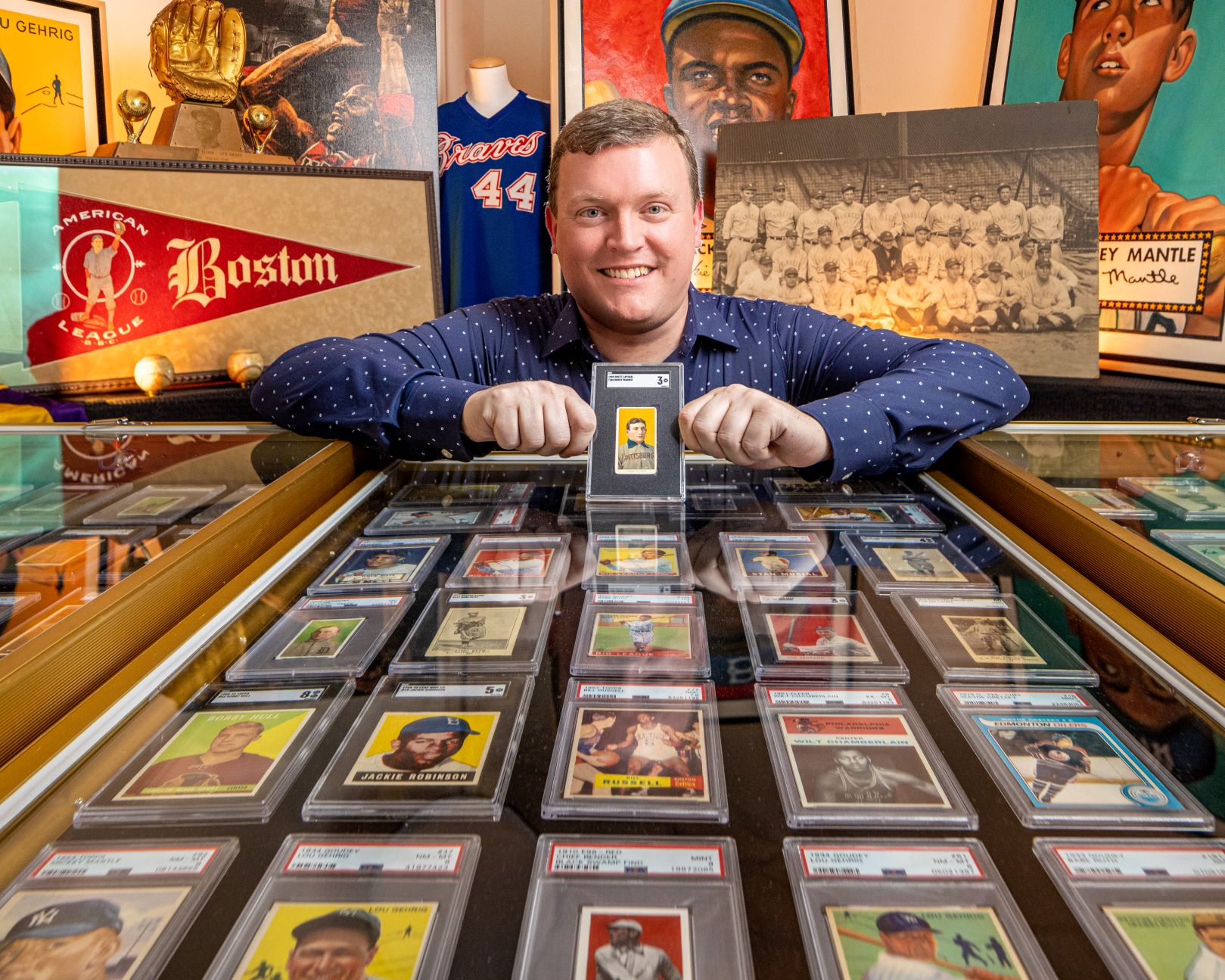Q&A with Brian Dwyer, President of Robert Edward Auctions
PJ Kinsella — April 26 2023

Brian took the leadership reins of REA in 2016 and has grown the Company substantially during that time, expanding from just a couple of auctions per year to almost one a month. In this deep-dive, he talks about his lifelong passion for the hobby, how he sees the trading card and sports memorabilia markets evolving, and some of the most valuable and unique items he’s ever handled.
What do you think has been the biggest change in the sports card and memorabilia collecting industry over the last 10 years?
Technology and the omnipresent opportunities to buy and sell cards and memorabilia are probably the two biggest changes I would point to in the last decade. Even though we’ve been holding auctions online for twenty years, the way in which we reach customers, promote material, acquire material, and conduct the auctions has changed even just in the last few years. Social media has been a great driver of change as it’s become ubiquitous and widened accessibility across the market. We’re able to more easily engage consignors and buyers from all over the world. Even the idea of live streaming and live shopping is something that is relatively new and exciting. In fact, Fanatics - which acquired Topps in 2022 - recently announced plans to launch a live streaming shopping platform where individuals can buy and sell sports memorabilia and trading cards, which will add a very interesting new facet to the marketplace.
Much like financial markets, greater automation and technology along with access to data have led to wider access to our industry as the learning curve and barrier to entry is not as great as it once was. This is tremendous as it brings in significant new buyers who are able to take stock of the market with data at their fingertips. Trading cards continue to sell at record-breaking figures, and there’s a growing market for game-worn and autographed jerseys, with Michael Jordan's 'Last Dance' Bulls jersey that he wore during Game 1 of the 1998 NBA Finals selling for $10.1 million in September 2022 and LeBron James' 2013 NBA Finals Miami Heat jersey selling for $3.6 million in January. This exposure is great for the hobby and ultimately leads to heightened consumer confidence.
While all these changes are going on around us, it’s incredible to see how one of the backbones of collecting - collectors’ desire to buy, sell and evaluate cards - remains alive and well. Yes, there are tons of options to sell and buy cards online but it’s been fantastic to see - especially following the changes enacted by COVID - that people’s desire to come out to shops and card shows is as strong as ever. And that’s how we know that the hobby continues to be strong even amidst broader economic uncertainty.
What's one change to the industry that you're forecasting over the next decade?
Sticking to the idea of technology, I think we’re going to see major innovation in the coming years. It’s going to be keep out or get out, in my opinion. We’ve made significant investment in our technology in the last several years, which has allowed us to scale our business considerably. For us, it’s going to be making these internal changes as well as making and embracing changes that make our clients’ experiences better too. Technology has evolved faster in the last ten years than it did in the one hundred years before that. It’s imperative that companies in this space stay ahead of the curve or they risk falling behind.
To that point, much like what we’re seeing in the fintech and health care technology sectors, consolidation is something that I think we will see more of in the years ahead. Companies willing and able to make investments will be positioned to offer a more complete suite of services to clients, which will enable them to cater to a much wider range of consignor and buyer needs and expectations.
What is the most unique card or piece of sports memorabilia you've ever owned?
I’ve collected baseball cards since I was five years old, and I am very fortunate that I’ve been able to collect at a much different level since my earliest days. My card collection has taken a lot of twists and turns, and I’ve had some great cards in my lifetime (and luckily I held on to a few of them too). But the most unique collectibles I own are multiple $500 and $1,000 bills. I got into collecting currency about a decade ago when I saw a $500 bill at a National show. It looked so out of place that it caught my eye and I was hooked. A lot of people don’t realize that these denominations were ever even issued. They were printed until the mid-1940s and then the government officially discontinued publishing both of these bills in 1969. The buy-in price in my experience is usually at least two times the face value for any condition. Like with cards, they can sell for many times more depending on their condition. I love collectibles like this that are interesting, historical, and conversation pieces where a little bit of information can be shared with someone who may be discovering them for the first time.
What's the most valuable card or piece of memorabilia you've ever had, whether it be sentimental or market cost?
At one point I owned a 1916 Sporting News Babe Ruth rookie card that I have since sold. I have also owned several 1952 Topps Mickey Mantle cards, some of which I’ve sold and some I still own.
If you could travel back in time, what would be the one game or sporting event that you would attend?
There are two that I’d love to see. As a lifelong baseball fan, I’d love to see Babe Ruth’s called shot on October 1 in Game 3 of the 1932 World Series at Wrigley Field. Everything about this event is part of baseball legend - the player, the moment, the game, the two teams, and even the stadium. It’s so legendary that many people even debate how authentic the Babe’s gesture actually was.
The other would be attending the 1972 Olympics to watch Steve Prefontaine. He was a guy that inspired an entire movement of runners in the 1970s and it was mind-blowing the records that he broke during his peak years.
You can have dinner with any three sports figures in history? Who are they and why would you pick them?
Steve Prefontaine - Growing up as a competitive runner, Pre was a figure that was constantly referenced as a generational talent. He died tragically at a young age in the prime of his career, and I think it would be very interesting to hear more about his own journey as a runner as well as his experience at the highest levels of the sport.
Bill Veeck - He was a lifelong baseball man who is credited with significant contributions to the game. He also was a brilliant marketing mind that pulled off some incredibly bizarre and unforgettable stunts that still raise eyebrows to this day. He might be best known for what he did when he was owner of the St. Louis Browns. He brought in Eddie Gaedel, who stood only three and a half feet tall, to bat. Gaedel walked on four pitches and was taken out of the game. He did a lot of things like this to draw fans into the ballpark even when his teams were not competitive on the field. I have no doubt that he would have remarkable stories to tell about his time as an innovator and an outsider within baseball.
Babe Ruth - It may sound cliche but I can only imagine how incredible it would be to hear stories from someone who was larger than life when he played. Ruth changed the game of baseball and was known almost just as much for his personality as he was for his dominance on the field. I’d also want to ask him what he was actually thinking and intending during Game 3 of the 1932 World Series when he called his shot. Was he calling his home run? Was he pointing to something else? There’s a lot of speculation around it even to this day and the Babe is the only one who truly knows.
You're creating the Mount Rushmore of Sports and have to pick one representative for each of the four major US sports (football, baseball, basketball, hockey)? Who are your four choices?
Tom Brady, Babe Ruth, Michael Jordan, and Wayne Gretzky.
